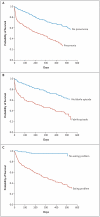The clinical course of advanced dementia
- PMID: 19828530
- PMCID: PMC2778850
- DOI: 10.1056/NEJMoa0902234
The clinical course of advanced dementia
Abstract
Background: Dementia is a leading cause of death in the United States but is underrecognized as a terminal illness. The clinical course of nursing home residents with advanced dementia has not been well described.
Methods: We followed 323 nursing home residents with advanced dementia and their health care proxies for 18 months in 22 nursing homes. Data were collected to characterize the residents' survival, clinical complications, symptoms, and treatments and to determine the proxies' understanding of the residents' prognosis and the clinical complications expected in patients with advanced dementia.
Results: Over a period of 18 months, 54.8% of the residents died. The probability of pneumonia was 41.1%; a febrile episode, 52.6%; and an eating problem, 85.8%. After adjustment for age, sex, and disease duration, the 6-month mortality rate for residents who had pneumonia was 46.7%; a febrile episode, 44.5%; and an eating problem, 38.6%. Distressing symptoms, including dyspnea (46.0%) and pain (39.1%), were common. In the last 3 months of life, 40.7% of residents underwent at least one burdensome intervention (hospitalization, emergency room visit, parenteral therapy, or tube feeding). Residents whose proxies had an understanding of the poor prognosis and clinical complications expected in advanced dementia were much less likely to have burdensome interventions in the last 3 months of life than were residents whose proxies did not have this understanding (adjusted odds ratio, 0.12; 95% confidence interval, 0.04 to 0.37).
Conclusions: Pneumonia, febrile episodes, and eating problems are frequent complications in patients with advanced dementia, and these complications are associated with high 6-month mortality rates. Distressing symptoms and burdensome interventions are also common among such patients. Patients with health care proxies who have an understanding of the prognosis and clinical course are likely to receive less aggressive care near the end of life.
2009 Massachusetts Medical Society
Figures



Comment in
-
Dying from dementia.N Engl J Med. 2009 Oct 15;361(16):1595-6. doi: 10.1056/NEJMe0905988. N Engl J Med. 2009. PMID: 19828537 No abstract available.
-
The clinical course of advanced dementia.N Engl J Med. 2010 Jan 28;362(4):363; author reply 364-5. doi: 10.1056/NEJMc0911058. N Engl J Med. 2010. PMID: 20107224 No abstract available.
-
The clinical course of advanced dementia.N Engl J Med. 2010 Jan 28;362(4):363-4; author reply 364-5. N Engl J Med. 2010. PMID: 20112444 No abstract available.
-
The clinical course of advanced dementia.N Engl J Med. 2010 Jan 28;362(4):364; author reply 364-5. N Engl J Med. 2010. PMID: 20112445 No abstract available.
-
The clinical course of advanced dementia.N Engl J Med. 2010 Jan 28;362(4):364; author reply 364-5. N Engl J Med. 2010. PMID: 20112446 No abstract available.
References
-
- Hoyert DL, Kung HC, Smith BL. Deaths: preliminary data for 2003. Natl Vital Stat Rep. 2005;53:1–48. - PubMed
-
- Mitchell SL, Kiely DK, Hamel MB. Dying with advanced dementia in the nursing home. Arch Intern Med. 2004;164:321–6. - PubMed
-
- Di Giulio P, Toscani F, Villani D, Brunelli C, Gentile S, Spadin P. Dying with advanced dementia in long-term care geriatric institutions: a retrospective study. J Palliat Med. 2008;11:1023–8. - PubMed
-
- McCarthy M, Addington-Hall J, Altmann D. The experience of dying with dementia: a retrospective study. Int J Geriatr Psychiatry. 1997;12:404–9. - PubMed
Publication types
MeSH terms
Grants and funding
LinkOut - more resources
Full Text Sources
Other Literature Sources
Medical
